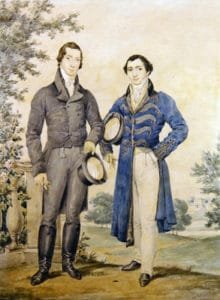What makes a gentleman?

If one wanted to marry a gentleman, one must identify said elusive creature first. So how exactly could one pick out a gentleman from the rest?
The nuances of social class and what makes a gentleman a gentleman remains a perennial source of confusion for Austenesque and Regency readers. The pages of Austen’s stories are littered with gentlemen, but offer absolutely no explanation of what that title actually meant. Of course, her readers knew exactly what she was talking about. How could she fail to realize that she would be read two hundred years later by people who would not intuitively know the same things. Really, how rude!
Still though, the questions remain: How did one get to be a gentleman—were they born or ‘made’? How did these men provided a livelihood for themselves and their families particularly since it appears that some gentlemen had a profession while others did not. Were all gentlemen equal or did they have differing ranks? Were gentlemen universally wealthy? It seems that they should be even that gets muddy wen considering the likes of Sir Walter Elliot (Persuasion) or Edward Ferrars (Sense and Sensibility). Were gentlemen really as rare as the Bennet girls’ laments suggested?
What made a Gentleman a Gentleman?
Gentlemen in general were members of the upper classes. If one was a gentleman, it was expected he would socialize with other gentlemen and marry a gentlewoman. But how did one recognize this elusive species?
Although many would site land-ownership, this was not fully the case. Not all land owners were gentlemen and not all gentlemen were land owners. The primary quality of a gentleman was that he did not sully his hands with work. His income came from other, more noble sources: passive income from rent and investments and honorariums offered by grateful recipients of their services. Note this was critically different than being paid for ones services. If one was paid for their work, their standing as a gentleman would fall into question. An army officer received an honorarium for his service whilst a common soldier was paid (and not very well at that, but that is another issue altogether.)

A large number of gentlemen were born to the designation. The eldest son of a gentlemen had the potential to inherit the means that made his father a gentleman and that would make him a gentleman as well—a landed estate, and (usually) the country house that went with it. The all-important estate provided the potential for rental incomes and income from agricultural and land based products like wood or coal, thus funding a gentleman’s life.
Simply inheriting a farm was not enough, though. One had to inherit (or purchase—but more on that point in a later chapter) a land large enough that the owner could rent tracts to smaller farmers and hire others to do the manual labor of the farm for him. If he had to farm the land himself, then he was a yeoman farmer. A respectable man for sure, but no gentleman.
So, how much land did it take to get one’s head above the gentlemanly line? In general, a yeoman farmer owned from one to three hundred acres of property that produced £40-50 a year. So a gentleman needed more than that.
What about the younger sons born to gentlemen? If the estate only went to the eldest, could the younger ones manage to be gentlemen, too?
The answer is yes. That is where the ‘honorariums offered by grateful recipients’ clause comes in. There were certain professions for which the practitioner was not directly paid for their services.
Four professions offered necessary qualifications to be considered ‘gentlemanly professions’: the church, the law, medicine and service as a military officer. All required a significant investment in the way of education or purchase of a commission, and provided an income disconnected from sullying one’s hands with work.
Gentlemanly Ranks

Not surprisingly in a rank obsessed society, there were gradations and ranks among the gentlemen. It goes without saying that titled peers in all their various forms occupied the top of society and were classed at the top of the gentlemanly ladder. Each title and title holder occupied a distinct rank and knew where he stood in relation to every other rank in England.
Immediately below the titled peers were the landed gentry. Though definitely part of the upper class, they were definitely lower ranked than the peers. Interestingly, their income might exceed that of peers who might be saddled with debt or other financial difficulties, but that’s another chapter.
Like the peers, the landed gentry were not created equal with some positioned some firmly above others. Within the landed gentry were:
Baronet. A position created by King James in 1611, giving the person a hereditary knighthood that passed to the eldest son, and the right to be addressed as “Sir.” These title holders were not considered part of the aristocracy and did not sit in the House of Lords. Sir Walter Elliot and Sir Thomas Bertram were baronets.
Knight. Originally a military honor, but came to be used as a reward for service to the Crown. This was not a hereditary title. The number of knights increased dramatically during the regency years, with a particular surge from 1811-1815. Sir William Lucas received his knighthood for giving a speech in a ceremony which would have included being presented at the royal court of St. James’s.
Neither the title of baronet nor knight conveyed any land or wealth to the title holder, nor any privilege beyond being addressed as ‘sir.’(and his wife as Lady His Last Name—can’t forget that one, right?)
Esquire/squire. Originally a title related to a knight’s attendant, it was an honor that could be conferred by the Crown. The title included certain offices such as Justice of the Peace and was used informally, unlike the prior two official titles. A squire was often the principal landowner in a district.
Gentlemen. This started as a separate title with the Statute of Additions of 1413. It became used to signify a man who did not have to work for a living. It was not a title and men would not be introduces as Mr. Smith, gentleman. While that might have been awkward, it did lead to some confusion as to the actual status of well-dress, well-mannered, wealthy young men—like Charles Bingley. He looked like a gentleman, he probably smelled like a gentleman, but he wasn’t a gentleman, yet.
Numbers in the Gentry
So just how many of these gentlemanly types were there?
At the start of the 19th century the landed gentry made up only a small part of the population. Whereas the peerage included about 300 families, the landed gentry encompassed closer to 25,000 or 26,000: 540 baronets, 350 knights, 6,000 landed squires and 20,000 just plain gentlemen. This group totaled about 1.5% of the national population and possessed about 16% of the national income. (Interestingly this is not out of line with the statistics in the US for 2010.) (Keymer, 2005)
Two very interesting things jump out about these statistics, first, the top 1.5% of the population controlled ten times their share of the wealth and that isn’t unusual for modern societies. So it is safe to say, on the whole, gentlemen were wealthy. Just how wealthy depended on the individual gentleman. Austen’s Rushworth was worth £12,000 a year, while Mr. Bennet was worth only £2000 a year. This did not make the Bennet’s even remotely poor though when you consider a middle class family could live comfortably on £250 a year.
Second, gentlemen (and their families) of all ranks made up only 1.5% of the population. Said another way, 98.5% of the population were not of the gentlemanly class. So by that standard, gentlemen were rare birds indeed. So, the Bennet sisters were probably right after all.
Interested in reading more about gentlemen of the regency era? Click HERE
____________________________
References
Kelly, Pauline E. (2009) Jane Austen Dictionary. Ink Well Publishing
Keymer, Thomas in Janet Todd (ed.) (2005) Jane Austen in Context. Cambridge University Press
Shapard, David M. (editor) – The Annotated Persuasion Anchor Books (2010)
Gornall, J. F.G. – Marriage and Property in Jane Austen’s Novels The Jane Austen Hampshire Group
Austen, Jane, and David M. Shapard. The Annotated Pride and Prejudice. New York: Anchor Books, 2003.
Austen, Jane, and David M. Shapard. The Annotated Sense and Sensibility. New York: Anchor Books, 2011.
Lane, Maggie. Jane Austen’s World: The Life and times of England’s Most Popular Novelist. 2nd ed. London: Carlton Books, 2005.
Laudermilk, Sharon H., and Teresa L. Hamlin. The Regency Companion. New York: Garland, 1989.

Both Army and Navy officers were paid by the Crown, though an Army officer would usually need additional income to be able to keep up appearances. The officer class drew their gentleman status from holding the King’s Commission rather than from the source of their income. Thus even relatively lowly men could become gentlemen through the armed forces and this was particularly true of the Navy, see Sir Walter’s concerns in Persuasion. A captain or admiral who had done well from prize money would be as rich or richer than many landowners. Others, less successful, would definitely be on the lower fringe of the gentleman scale. Of course a merchant navy captain could become very rich but he would not be a gentleman because he was in trade.
Thank you
How interesting. Getting married was a hard business back in the day and poor Mrs. Bennet would grab at anything that half-way resembled a gentleman for her girls. She didn’t care about anything other than seeing them well placed. Perhaps I shouldn’t be so angry with her after all… NAW!! She was horrid to disregard the happiness of her girls over being being married. I certainly enjoyed this post.
Thanks J.W.!
Thanks were very very different then. It is important to remember that people had very different expectations of marriage than we do today and that made a big different.
What fascinates me is that in Pride and Prejudice, Austen refers to Wickham as a gentleman, through Darcy’s voice, of all people. It really twisted my view of what I understood the word to mean as per this article.
It really did mean something entirely different than we tend to expect. Thanks, Suzan!